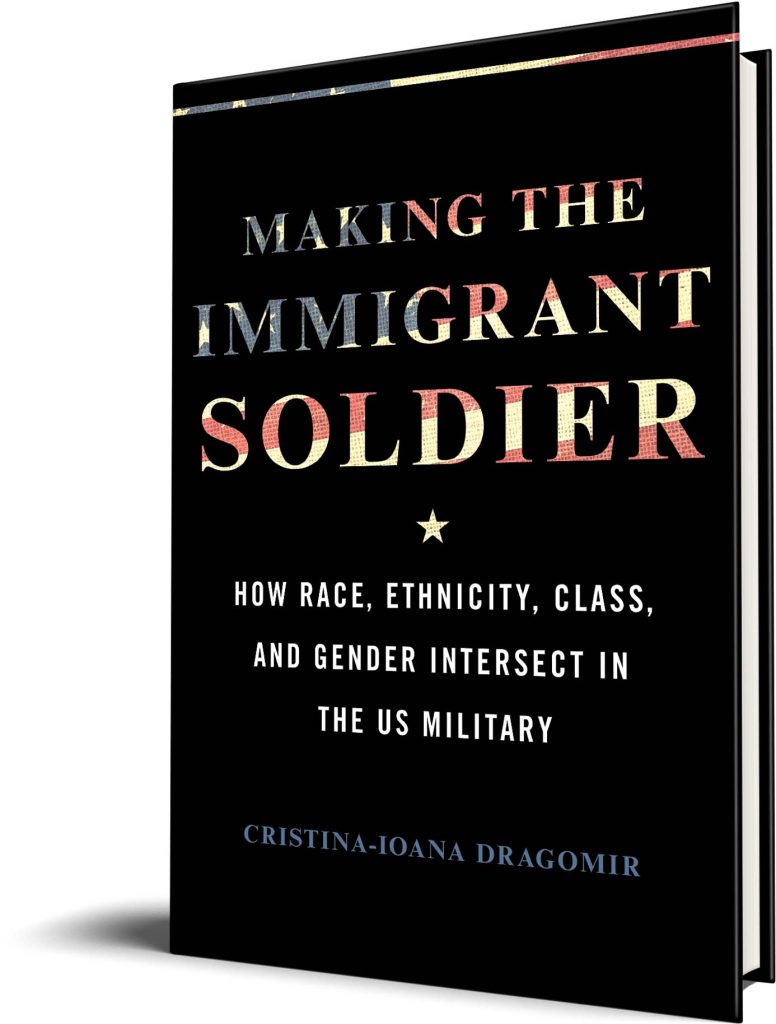Cristina-Ioana Dragomir, author of Making the Immigrant Soldier: How Race, Ethnicity, Class, and Gender Intersect in the US Military, answers questions on her scholarly influences, discoveries, and reader takeaways from her new book.
Q: Why did you decide to write this book?
How one becomes a citizen of another community it is something that always fascinated me. Moreover, I find puzzling how does one become an American? And how does one decide to possibly give their life to serve and defend a country that is not theirs? How is this just? Are they treated justly by the society that they are defending? With these questions in mind, I approached the topic of immigrant soldiers in the American military, and I was very fortunate to meet here amazingly generous individuals who agreed to share with me their lives, and tell their life stories in this book.
Q: What is the most interesting discovery you made while researching and writing your book?
I was surprised to see how immigrants were both willing to become soldiers, and how they were interested and proud in keeping their identity. It revealed how complex and everchanging our identities are, how we can inhabit multiple identities at the same time. How we all navigate at times arduous social terrains, where our main identity is not accepted, and how we manage to adjust.
Q: What myths do you hope your book will dispel or what do you hope your book will help readers unlearn?
Everyone, wherever they are in the world, long for justice. Long for being seen as a part of a community, and being treated with respect. One’s decision to enlist in the military is a personal, and complex decision, one that needs to be respected, honored, and supported by programs and policies. Especially in the case of immigrant soldiers, as they are a part of large community willing to do the hard work, possibly giving their lives to empower ours.
Q: Which part of the publishing process did you find the most interesting?
It was fascinating to see how reviewers reacted to reading the book. Their reaction said (of course) a lot about the book, but also about their scholarly views, and—more generally—where we are in the social sciences today. I also was thrilled to find alike minds, who have been supporting a more human approach to Social Sciences, one that empowered storytelling, who understand that sciences are also changing, and who are committed to addressing issues of social justice through in-depth accounts of people’s lives.
Q: What is your advice to scholars/authors who want to take on a similar project?
I hope more people will work on understanding migration, mobility, and movement. Our quest for justice can take numerous forms. We can work at the meta level, and on the ground. We can be activists, students, allies and scholars. And all of these at the same time. Justice for those who move around the world needs be always be on our mind. Because moving, migrating is a part of our human history, and is definitely a part of our future.
Q: What do you like to read/watch/or listen to for fun?
This is the most difficult question. I enjoy listening, watching, and reading classical murder mysteries. I love Hitchcock, Christie, and alike. And Eastern European and Indian contemporary music, literature and cinema—which is often intense, but could be fun!

Cristina-Ioana Dragomir is a clinical assistant professor in global liberal studies at New York University. She consults with the United Nations, Deutsche Gesellschaft für Internationale Zusammenarbeit (GIZ) and the International Organization for Migration. She is the author of Power on the Move: Adivasi and Roma Accessing Social Justice.

